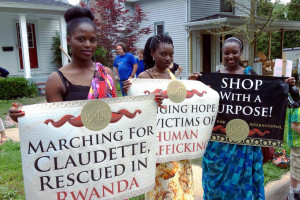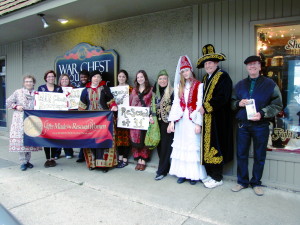A look at hope & healing
Fluorescent light bathes the room, spilling onto the black tables and empty, cushioned, swivel chairs. The tables are laden with plastic organizers, boxes, and a metal basket stuffed with scissors, pliers, glue, pens, and a few pieces of candy. Shelves and cabinets line the perimeter of the room, filled with beads, spools of ribbon, wicker baskets, and more. A quilt and other decorations adorn the walls. One is a slip of paper, upon which a Psalm of longing and invocation is handwritten.
This is the U.S. Training Center within WAR, Int’l, and the strong, brave women who sew, fashion jewelry, and concoct spa products here are survivors of sexual exploitation—a horror that many of us can’t fully grasp; we can only brush our fingers against it, feel the dips and grooves of the scars it leaves on flesh and soul. The women may be free from their abusers, but they are not yet free from the burdens of their dark pasts. Yet strangely enough, they have an advantage that non-victims do not: they know—truly know—what it’s like to wear a price tag, what it’s like to be used, what it’s like to be abused again and again and feel helpless to stop it. And their experiences can galvanize them to take action against the risk of trafficking and exploitation.
Before that happens, however, healing of all sorts needs to take place. First, caring people need to clean and bandage their physical wounds. The meaning of this may be literal; victims are often physically abused and beaten. But they also need to be treated for other physical problems: dangerous pregnancy, STDs, and malnutrition, among other things.
The body often heals more quickly than the mind, so psychological issues may linger long after the wounds have scabbed and the infections have cleared. This is because women in the sex industry have experienced a great deal of trauma. They have most likely been raped. Clients have stripped away their humanity, turning them into objects for their own personal pleasure. Pimps have threatened and abused them. So it’s no wonder that they suffer from PTSD, substance abuse, dissociative disorders, anxiety, depression, and thoughts of suicide. One can understand why they feel worthless, helpless, and ashamed (though they are, in reality, strong, beloved, and blameless). It’s no surprise that they must renew their lost sense of identity.
The healing process can span for years. Take Theresa Flores, the founder of Traffickfree. She still experiences nightmares about the times she was trafficked as a teenager. But recovery can and does take place. One woman in the U.S. Training Center, Monique, is steadily heading in that direction. Once a victim of the sex industry, she now aspires to open her own jewelry-making business. She is currently honing her skills in preparation for that day, designing and repairing gorgeous jewelry for WAR Chest Boutique.
Life may never be the same for survivors, but this is not always a bad thing. Sometimes those who were formerly voiceless become powerful vessels for change. They share their stories in front of audiences, build organizations that advocate on behalf of victims, and work to rescue those who are still trapped. Theresa Flores founded the S.O.A.P. program, a  clever and effective way to reach trafficked women and girls. This initiative labels bars of soap with the Human Trafficking Hotline. Before large-scale events, the soaps are distributed to hotels and motels, where trafficked individuals can find them and seek help. Anny Donewald—a former exotic dancer and prostitute—founded Eve’s Angels. Among other things, this organization reaches out to women in the sex industry by visiting them in their places of employment. They show women the love of Jesus and offer them a way out. WAR, Int’l’s very own Rhoda Kershaw—another survivor of sex trafficking—is a powerful advocate and dear friend of ours. She also uses her experiences for good, sharing her story and speaking out against the crime of human trafficking at our Civilian First Responder conferences. Though Monique is still involved in our program, she is already using her experiences to spark change; she recruits other women into the U.S. Training Center, inviting them to join her on the road to healing.
clever and effective way to reach trafficked women and girls. This initiative labels bars of soap with the Human Trafficking Hotline. Before large-scale events, the soaps are distributed to hotels and motels, where trafficked individuals can find them and seek help. Anny Donewald—a former exotic dancer and prostitute—founded Eve’s Angels. Among other things, this organization reaches out to women in the sex industry by visiting them in their places of employment. They show women the love of Jesus and offer them a way out. WAR, Int’l’s very own Rhoda Kershaw—another survivor of sex trafficking—is a powerful advocate and dear friend of ours. She also uses her experiences for good, sharing her story and speaking out against the crime of human trafficking at our Civilian First Responder conferences. Though Monique is still involved in our program, she is already using her experiences to spark change; she recruits other women into the U.S. Training Center, inviting them to join her on the road to healing.
You can help these advocates and promote change alongside of them. Get involved with organizations founded by human trafficking survivors. Volunteer to label bars of soap with Theresa Flores. Show sex workers the love of Christ with Anny Donewald. Stand up with Rhoda Kershaw and speak out against the injustices that are perpetrated against millions of people worldwide. Join Monique and search for women to rescue. It doesn’t matter where or how you help. Every second of time you give makes a difference.
You can also walk with rescued women on the path to healing by purchasing the work of their hands. This gives them a livelihood, a positive way to support themselves, a means of escape from traffickers. When you wear or use their products, you share their story and give them a renewed sense of dignity.
Finally, treat everyone you meet with love and respect. Unless you are told, you have no way of knowing what another person’s life looks like. Physical wounds may be covered with clothing, and emotional wounds can be concealed with fake smiles. The worst case scenario may not be true, but act as if it is. After all, everyone struggles with something and needs compassion. Your kindness alleviates pain and gives strength to those who feel weak—whether they are trafficking victims or not.








